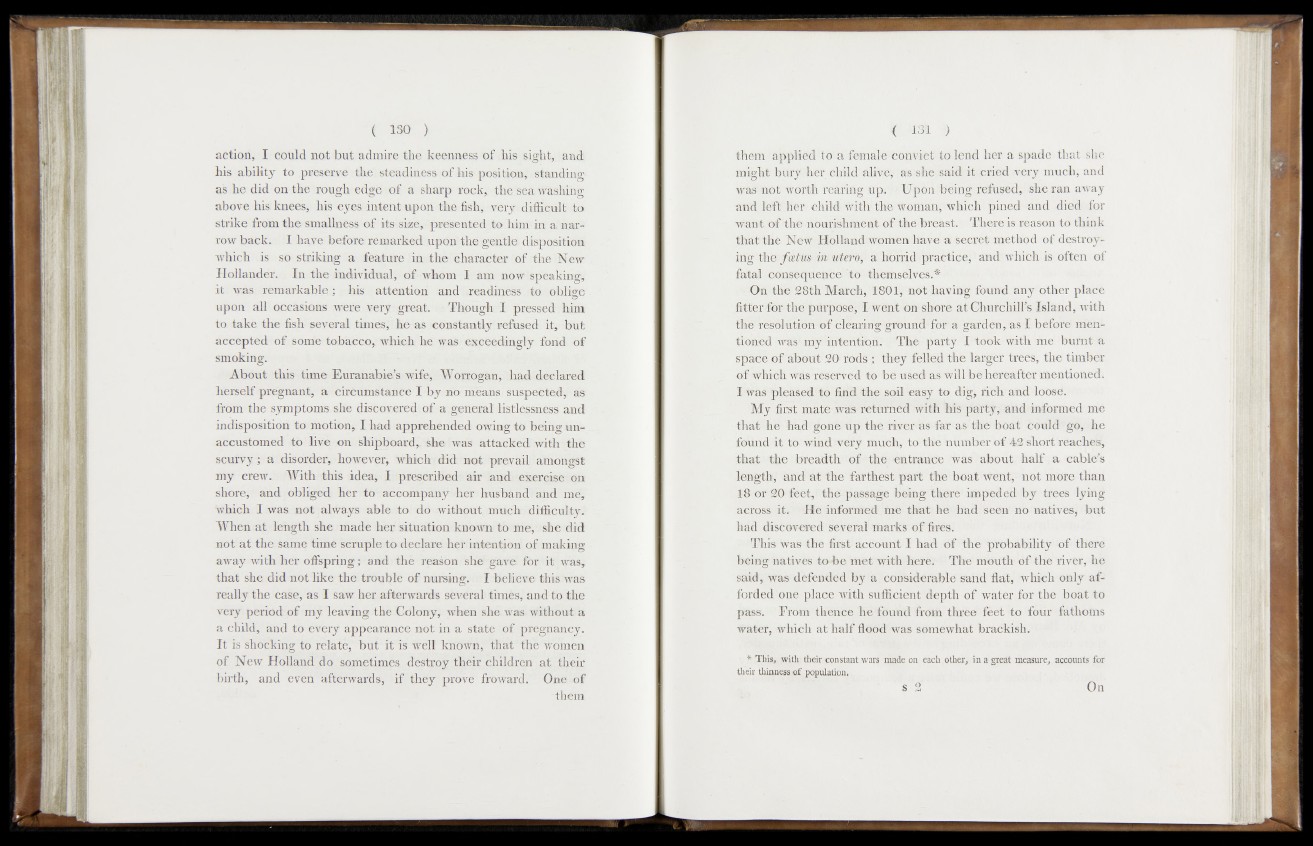
action, I could not but admire the keenness of .his sight,, and
his ability to preserve the steadiness of his position, standing
as he did on the rough edge of a sharp rock, the-sea -washing
above his knees, hi! ey§® intent upon the fish, very-difficult to
strike from the smallness of its size, presented to him in a narrow
back. I have belbre remarked upon the)genttec^^ositi#n
which is so striking a feature. in th e ' eharieter 'of rth#'#6inr
Hollander. In the individual, of whom I am noW;speaking
it was remarkable; his attention and ..i«adlS^V?ter oblige
upon all occasions weie very great, - Though I pressed Mbs
to. take the fish several, times, h em : constantly refused it, but
accepted of some tobacco, which he was exceedingly fond of
smoking.
About this time Euranabie’s wife, Worjogan, had declared
herself pregnant, a circumstance I by no means sukpeeted, as
from the symptoms she discovered of a, general listl^ssitiess and!
indisposition to motion* I bed; apprehended owing to being unaccustomed
to live on shipboard* she was attacked with the
scurvy; a disorder, however, which did n e t -prevaildaMotigst
my crew. With-the idea, I prescribed air an d exercise ron
shore, and obliged her to accompany her husbandl and me,
which I was. not always able to do without'mdcli^difficnify#
When at length she made her situation known to me,- she did
not at the same time seraple to declare hei intentiod. of making
away with her offspring ; and the reason she gave for it was,
that she did not like the trouble of nursing. I believe this was
really the case, as I saw her afterwards several tirnOs, and to the
very period of my leaving the Colony, when she was without a
a child, and to every appearance not in a state of pregnancy.
I t is shocking to relate, but it is well known, that the women
of New Holland do sometimes destroy their children at their
birth, and even afterwards, if they prove fro ward. One of
them
them applied to a female convict to lend her a spade that she
might bury her child alive, as she said it cried very much, and
was not wd#th rearing up. * Upon'feeing/refused, she ran away
and left'her-child witW thé-Woman, which pined- *and died for
want of %h@^burishment of the breast., There is reason to think
th a t thè New Holland women have a* «secret method of destroying
the" féfâ&Hn utero, ■ a, horrid practice, ■ and which, is often of
fatal consêquehee'to themselvdsS*
:l*f)n the iSth March,'1801, not having found any* other placé
fitter fo r the purpose, H went onshore at^t®hurehffl% Island*-with
tk'é-rrêsëlution of Nekping grmmtbfdr* a gafdeh,*as I before men*
tfe&éd was; nà^-Mfehtifeh." The- party I-took with m e burnt a
s'JSâ'èê of about-2G rods ; they felled the larger trees, the timber
of whieli wds reserved-to be-usOdUs will bé hereafter mentioned»
I was pleased to find the soil easy to dig* rich' and -loosd.
Mjîùfersf mate* was returned with ids party; and informed me
that he hbd ^ohe tip the river as far as the boat èótfld go, he
found it to wind very much-, totfete number Of 42 short reached,
that dhe breadth of the entrance was about half a cablets
length; and a t the farthest part the boat went; not more than
1-8'or 20 feet, th© passage being there impeded by trees lying
actpss-dwss He informed.me tfeM he^hadhfeAi’ no natives; but
had discovered sevemlm-arks o ffre s; -
• -This Was the first account 1 had o f thé probability-Mff there
being natives toffee met withheïe.' The mouth of the river, he
söid, was defended ;by a cdhsidemble sand flat, which only afforded'Oné
place-with sufficient depth of water for the boat to
pass. From thence he found from three feet do four fathotns
water, which at half flood- was somewhat brackish.
* This, with their constant wad made on each other, in a great measure, accounts for
their thinness *of population.
s 2 On